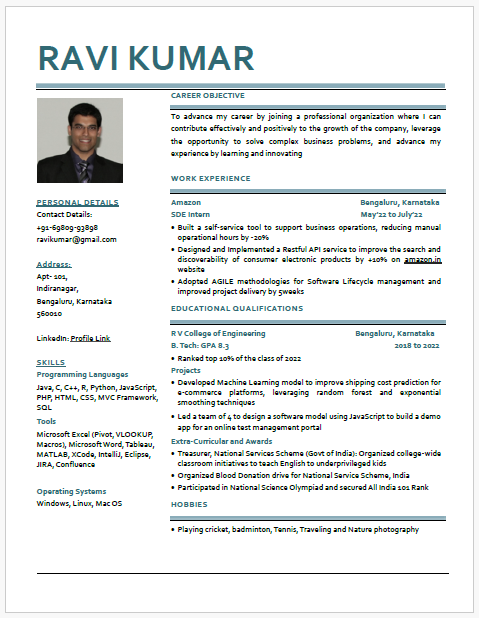Software Development Engineer
B. Tech

About this template
This is a very simple and professional resume which can effectively highlight your skills and experiences in a clear and concise manner.
This template is made in MS Word so, users can easily customize it to fit their specific needs.
Some most important technical skills for Software Development Engineer
Here are some of the most important technical skills for a Software Development Engineer, each described briefly:
1. Programming Languages:
Proficiency in programming languages such as Python, Java, C++, or JavaScript is fundamental. These languages form the backbone of software development, enabling engineers to write, test, and maintain code efficiently.
2. Data Structures and Algorithms:
A strong understanding of data structures and algorithms is critical for writing optimized code. This skill allows engineers to solve complex problems, improve performance, and create scalable applications.
3. Version Control Systems:
Knowledge of version control systems like Git is essential for collaborative development. This skill ensures that code changes are tracked, managed, and integrated smoothly within a team, preventing conflicts and ensuring code integrity.
4. Software Testing and Debugging:
Proficiency in testing frameworks and debugging tools is crucial for ensuring software quality. Skills in writing unit tests, integration tests, and using debugging tools help identify and fix bugs, leading to more reliable software.
5. Database Management:
Understanding database management systems like MySQL, PostgreSQL, or MongoDB is vital for handling data storage and retrieval. This skill ensures that applications can efficiently manage and scale data as needed.
6. Object-Oriented Programming (OOP):
Mastery of OOP principles is key to writing modular, reusable, and maintainable code. This approach simplifies complex systems by organizing code into objects, making it easier to manage and extend.
7. APIs and Web Services:
Knowledge of APIs and web services is essential for building applications that interact with other systems. Skills in RESTful APIs, GraphQL, or SOAP enable seamless integration and data exchange between different software components.
8. Cloud Computing:
Familiarity with cloud platforms like AWS, Azure, or Google Cloud is increasingly important. This skill allows engineers to build, deploy, and manage applications in scalable, cost-effective, and flexible cloud environments.
9. Agile Methodologies:
Understanding Agile methodologies like Scrum or Kanban is important for efficient project management. This skill helps in delivering software iteratively, responding quickly to changes, and improving collaboration within the team.
10. DevOps and Continuous Integration/Continuous Deployment (CI/CD):
Proficiency in DevOps practices and CI/CD tools like Jenkins, Docker, or Kubernetes is crucial for automating and streamlining the software development lifecycle. This skill ensures faster and more reliable software releases.